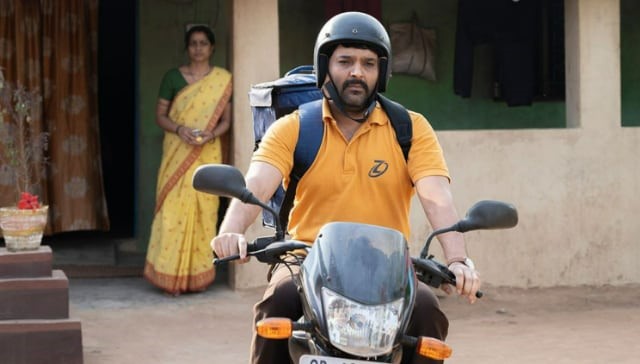
Zwigato review: A tender, insightful portrait of the disenfranchised in shining India

In a scene from Nandita Das’ Zwigato, a mall manager tells a couple of women that while they do their night shifts, they are also expected to clean the men’s toilets.
“Kyun ghar mein nahi karte kya” (why, you don’t do it in your homes), he says to two women who look on dumbfounded. It’s a stunning sequence, its bruising punch delivered with the alacrity of something we have all, collectively, returned to our subconscious. Of course, women, or at least those without exemplary privilege, clean toilets at homes.
Who else would it be? It’s a moment that tells us that class fissures exist even where economy, as a tangible thing, ceases to. Das’ Zwigato is a tender, if raw examination of the disenfranchised and while it wants to make a social message one too many, it revels in the understated, almost awkward brilliance of its unlikely protagonist – Kapil Sharma.
In Zwigato, Das innovates not once but twice. Not only does she get the country’s most popular comedian to play a watered down, beat, spoke of the cyclical gig economy, but the director also sets the story in Bhubaneswar, far away from the trained suburbs of Delhi or Mumbai. The result is enthralling, for each turn Sharma takes on his bike, each street he leaves behind in the receding fog of his rear-view mirror, feels like a fresh departure.
Sharma plays Manas, a laid-off manager who takes up the job of a delivery boy (man) to tide over months of joblessness. He is supported by a doting wife in Pratima, played by the exceptional Shahana Goswami. The couple have two kids, an ailing mother and barrage of financial challenges with no relief in sight.
Manas works for Zwigato (no connection with Zomato or Swiggy, but you get the point), a food delivery company. Sharma’s charms, his typically dispassionate delivery works wonders when channelled as resentment. It somewhat flounders when it has to convey actual contempt.
Also read: All Quiet on the Western Front review: A meditation on meaninglessness of war
The film follows the husband’s travails on the job, as his wife too volunteers to work, so the family can make ends meet. Manas is opposed to the idea, more as a principle of manhood than as a form of functional reality, his heart says, is inevitable. There is no choice, and yet the conundrum of masculinity, its prideful restrictions, continue to pin him down.
It’s a beautifully crafted dilemma, one that Sharma’s somewhat raw acting justifies by quite simply, not revealing a scarred, inner self. But while his upright, sharp wit, assails the challenge of beamy authenticity, it struggles in moments where raw emotion must take over.
Das has always evoked worldly social realities through her bespoke practices and even though her films echo an elitist understanding of how the streets speak, they still reveal extraordinary sights. In one scene, a Muslim delivery boy panics when he realises he is expected to deliver inside a temple. In another scene, Manas makes a delivery to a house where a man is on the brink of either puking or choking.
It’s incendiary, cruel to think that at one end of this brutal world a man chases ₹15 rupee incentives delivering food that people at the other end, willingly throw up. These are all wonderful insights but the problem with Zwigato is that rather than focussing on the two-dimensional story of a couple’s resilience, it wants to canonise far too many issues at once. As a result, the film’s foundational principles, often collapse under the weight of its social provocations.
Das’ direction isn’t always perfect for it is often upstaged by the short breaths, the film takes between needling the fabric of its story to assert a certain social acumen. At times, it frankly talks down to people. But, Zwigato still manages to illustrate an elusive demographic, a unique image of India’s socio-economic borders from where the punches never stop flying.
Also read: ‘Everything Everywhere All At Once’ review: A migrant story with a human soul
Life will just find ways of pulling the rug from under your feet, the film says. All we really need to do is to learn to jump from one sliding, dusty rug to the other. The gig economy is basically that: one dastardly, demeaning job after the other. But there is also the romance of it, the idea that to a majority of this country, even the promise of regular money and a brand stamped t-shirt, means something. It stands for promise, maybe even agency.
Das examines the entire range of this difficult debate, that in effect, also draws away from the emotional heft of the main characters. Far too many things, after a point, jostle for space.
There is a lot to love about Zwigato, foremost of which is the casting, ironically, of one of India’s richest gig-workers at the bottom rung of the food chain. Sharma isn’t a revelation here but the acerbity of his sharp, at times shrill humour, plays right into the hands of Manas’ resentful, if admirably restrained self.
Something must be said about the ingenuity of this choice, the caveated feat of inserting a cocksure, possibly majoritarian comedian, into a role where he is, for a change, made to look like the fringe. Sharma is assisted by a terrific Shahana, and a cast of untrained actors, who randomly yet specifically humanise a social economy that we consume but never quite memorise. From the same economy bloom dreams, despair and desperation. All gigs, that life tasks us with. Some more so than others.


